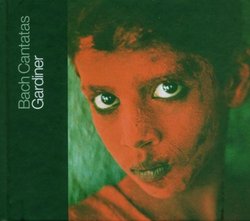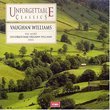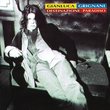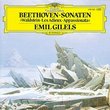| All Artists: Johann Sebastian Bach, John Eliot Gardiner, English Baroque Soloists, Lisa Larsson, Christoph Genz Title: Bach: Cantatas, Vol. 26: Long Melford Members Wishing: 0 Total Copies: 0 Label: Soli Deo Gloria Original Release Date: 1/1/2006 Re-Release Date: 7/11/2006 Genre: Classical Styles: Opera & Classical Vocal, Historical Periods, Baroque (c.1600-1750) Number of Discs: 2 SwapaCD Credits: 2 UPC: 843183012121 |
Search - Johann Sebastian Bach, John Eliot Gardiner, English Baroque Soloists :: Bach: Cantatas, Vol. 26: Long Melford
 | Johann Sebastian Bach, John Eliot Gardiner, English Baroque Soloists Bach: Cantatas, Vol. 26: Long Melford Genre: Classical
|
Larger Image |
CD DetailsSimilar CDs |
CD ReviewsSAME OLD STORY GEORGE RANNIE | DENVER, COLORADO United States | 10/23/2006 (5 out of 5 stars) "Again, I am obliged to write another glowing review to yet another installment of Gardiner's J.S. Bach Pilgrimage. This eighth release (actually Volume 26) is again superb in every way! Once again Bach's genius as a composer is very evident in this 2 disc set; these cantatas are obviously works written by a master composer plus they are performed magnificently. In this release (Volume 26) JS Bach is at his most exalted, affirmative and festive--with lots of great trumpet sounds through out. Listen to the beginning choruses of "Ershallet, ihr Lieder" on tract one and the opening chorus of "Wer Mich Liebet" on tract 13 of the first disc. Also listen to the "Sinfonia" on tract 12 of the second disc--an expanded version of, I believe, of the third movement of his third "Brandenburg" concerto Once again, I was simply overwhelmed at Gardiner's leadership of the Monteverdi Choir and of the English Baroque Soloist. The aforesaid groups certainly play and sing dear Johann in a most wonderful manner. The aforesaid examples of this recording simply lifted my soul as close to paradise as I will possibly ever get. All of the soloists in Volume 26 are superb! Lisa Larson possesses a beautiful soprano voice. Listen to her ravishing duet with contralto Nathalie Stuzmann on tract 5 of the first disc. She shows her sublime coloratura abilities on tract 14 of the first disc. Bass, Panajotis Iconomou has a full, rich and flexible voice--listen to his arias on tracts 11 of disc one and tract 10 of disc two. Christopher Genz has a marvelous sounding and flexible tenor which can turn heroic when required--listen to his very exciting florid aria in tract 17 of the first disc. Although Nathalie Stuzmann. Contralto has some difficulties with her coloratura aria she exhibits good legato in her aria on tract 19 of the first disc. In conclusion, this eighth release (Volume 26) is yet another outstanding addition to Gardiner's J.S. Bach Pilgrimage. If you love Johann's music, as I do, buy this installment; it's glorious! (By the way, these Cantatas were written for "Whit Monday" which, I'm sure has some religious significance; however, as I have indicated before being a confirmed heathen I really don't know what the significance is. What I DO know is that the music and the performances contained in Volume 26 are marvelous!) " LONG MELFORD, SHORT CANTATAS DAVID BRYSON | Glossop Derbyshire England | 09/07/2007 (5 out of 5 stars) "This set comprises four cantatas for Pentecost Sunday on the first disc and three more for the Monday on the second. Generous measure indeed, but in fact the first disc lasts just under 70 minutes, and the second clocks out after not much more than three quarters of an hour. If that suggests in any way that these might be 'minor' cantatas, then to quote an advertisement lately popular 'it doesn't work like that'. The unswerving and optimistic faith that inspires Bach's cantatas is the same faith be they long or short, and the inspiration is the same inspiration. There are even a couple of well-known numbers here, one being the soprano aria 'Mein glaeubiges Herze' in cantata 68, sometimes known in English as 'My ever-faithful heart'; and the other is the first movement of the third Brandenburg concerto slightly modified as the opening sinfonia to cantata 174.
This leg of the pilgrimage through the Bach cantatas has taken Gardiner and his colleagues to the beautiful perpendicular church of the Holy Trinity at Long Melford in Suffolk, and two photographs are provided. No difference in the acoustics of the various locations seems to give the technicians of this series any problems, and the sound is admirably sympathetic and appropriate again. No hint of fatigue or routine affects the performers either, and the stylistic sense as well as the technical accomplishment is as admirable as ever. The alto is female this time, Nathalie Stutzmann, and that is how I prefer altos in general, but if there is a particular star among the four vocal soloists it is perhaps the tenor Christoph Genz who also contributes the short essay at the back of the set. Some of his music, such as the aria O Seelenparadies that he himself highlights in cantata 172, is exceptionally vivid, and he has the voice for that. Much of the instrumental work is exuberant in tone, as befits this stage of the liturgical year, and the playing is distinguished by both tact and gusto. The production is to the standard format of this series, presented as a sort of book - an attractive format but one that calls for care in removing the discs. There is Gardiner's standard introduction as always, and another of the long and illuminating essays that he wrote for himself by way of a journal of the project's progress. One very odd sign of what may have been strain has crept in this time however. He protests in understandable exasperation at commentaries which make a foolish fuss over Bach's self-borrowings, but adds the quite gratuitous statement 'You'd have thought that Handel, with his habit of plagiarising other men's themes as starter fuel when the muse refused to co-operate, would have presented a juicier target.' We are not supporting rival football teams in the first place. In the second place, it can hardly be news to this erudite musician that for half a century and more there was an entire industry dedicated to identifying Handel's borrowings, real or supposed, toiled at by writers who had little or no opportunity to hear either the Handel works in question or the alleged sources of this or that 'theme'. Gardiner must know better than I do that there has been competent and methodical modern scholarship that makes sense of this issue, and that the matter is not properly expressed in these terms, which would have been unperceptive in 1900 let alone 2000. That, plus the error in describing the duet Nichts kann mich erretten in cantata 74 as an alto aria, are the only two trifling faults that I find with this set. The whole series is a great and awe-inspiring labour of love, undertaken in support of a greater. These artists' pilgrimage is one in whose steps I feel honoured to follow." |

 Track Listings (25) - Disc #1
Track Listings (25) - Disc #1

